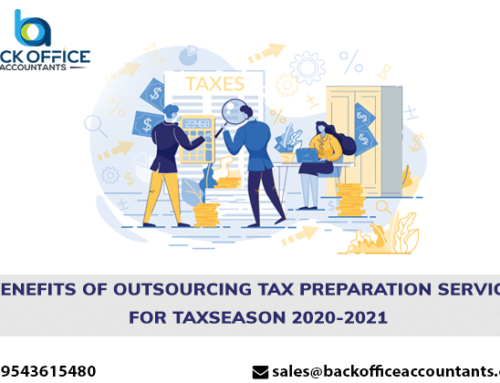The realm of real estate is dynamic and like any other business, financial management plays a massive role here. Managing finances is crucial for driving business growth yet it often goes unnoticed. Having a clear picture of financial health helps in making well-versed business decisions.
Unfortunately, many real estate companies don’t understand the need for financial management hence suffering losses. A real estate company that understands the importance of accounting stands a higher chance of success than those who don’t. Back office accounting is the key to streamlining finances. It helps in decision-making, planning, and recognizing growth opportunities. By investing in financial management practices, business can optimize their performance, set benchmarks, and help the business flourish.
A strategic choice, back office accounting can assist real estate firms in enhancing their scalability, productivity, and compliance regulations. By outsourcing financial management to a seasoned service provider, real estate firms can concentrate on their fundamental capabilities.
The Importance of Efficient Financial Management in Real Estate
Flourishing the real estate business is not a cakewalk. Poor financial management can lead to cash flow issues, incorrect tax calculation, compliance penalties and ultimately hurting your bottom line. There are many negative consequences of poor financial planning which can lead you to bear a heavy price in the future. But taking complete control of your finances can help in mitigating risks. Efficient accounting solutions are important for a real estate firm to improve financial management. With solutions tailored to a firm’s needs, finances can be managed well. With the accurate solutions, you can ensure that your accounting practices are always compliant.
Key Financial Challenges Faced By Real Estate Firms
From intricacies in financial issues to the continuous evolvement of market trends, real estate firms face different problems in managing daily operations and long-term planning. The major financial challenges faced by the real estate firms are:
- Irregular cash flow: Cash flow is the core of any real estate business. Property sales cycle, leasing adjournments, and periodic fluctuations can lead to irregular cash flow. With tracking, it is easy to prevent cash shortfalls. Firms can ensure that the business has adequate liquidity to mitigate the obligations.
- Complex transactions: Real estate transactions can be complex due to different factors comprising multiple revenue streams, contract negotiations, legal intricacies, and complicated financial tracking. This needs careful navigation and professional analysis.
- Tax compliance issues: Compliance with different financial regulations and tax laws is obligatory. As there is a constant change in the tax regulations and deductions related to real estate, keeping track is imperative. Non-compliance can lead to heavy penalties, legal issues, and damage to the firm’s reputation.
- Delayed payments: It is important to be vigilant when it comes to tracking multiple payments. Multiple properties mean multiple sources of income. Besides, delayed payments are a common hassle. By managing accounts proficiently, you can avoid financial blockages.
How Back Office Accounting Helps Real Estate Firms
Back office accounting ensures accurate tracking of all the financial transactions. This in turn provides a clear picture of the business’s financial health.
- Automated Bookkeeping and Data Entry: With effective bookkeeping software, automatically records all the incomes. This helps reduce manual errors and improve accuracy. Implementing an automated system also sends payment reminders.
- Efficient accounts payable & receivable management: With the right software payments and cash flow can be managed properly. Efficient account payment and receivable management comprises optimizing the cash flow by paying vendors on time, collecting payments, use automation and technology to streamline all the processes.
- Financial reporting and forecasting: Accurate financial reporting and forecasting help in providing a clear and comprehensive analysis of a property; ‘s financial performance. This helps in making informed decisions about the property. Financial reporting helps firms make data-driven decisions.
- Tax Preparation and Compliance: Real estate firms are subject to different financial regulations and non-compliance can lead to penalties. To avoid such complications, back office accounting is important. Regular reporting maximizes deduction. Keeping accurate records means simplified processing of financial statements and tax returns.
- Payroll processing: Tailored payroll processing maximizes the ROI of the firm. It helps in simplifying salary payments for real estate agents and staff. From efficacious payroll administration to management, find customized solutions.
Benefits of outsourcing back office accounting for real estate firms
Financial reporting is an essential tool for any real estate firm. By managing finances accurately, firms can seize scalability. Outsourcing financial services from seasoned professionals will enhance your financial stability and position your business for sustained growth.
- Cost savings: Outsourcing back office accounting can lead to cost reduction. Companies save on the expenses of hiring full-time employees. Outsourcing such kind of services eliminates the need for investments in accounting. The real estate firms can focus on their main job.
- Time efficiency: As real estate firms are not experts in managing accounts, they tend to waste a lot of time managing their finances. When financial management is offloaded, the in-house team can dedicate time to work on the company’s growth, innovation, and customer satisfaction.
- Better compliance: Outsourcing back office accounting companies ensures all the tasks are managed properly. Tasks related to compliance, quality assurance, and risk assessment are handled by experts. Outsourcing firms also adhere to stringent data protocols and ensure that real estate firms stay updated with tax laws and financial regulations.
- Scalability: When there is a workload fluctuation, the companies can scare their accounting needs. This provides the company with great flexibility without compromising the work quality.
Final Thoughts
Understanding the needs of the hour is a cornerstone for success. Armed with the insight gained from back office accounting, you can empower your business. By embracing financial strategies, you can navigate market dynamics and capitalize on growth opportunities. Now is the time to facilitate strategic measures to throw light on sustainable business growth. Looking for expert back office accounting for your real estate firm? Contact us today! Book Now







